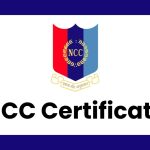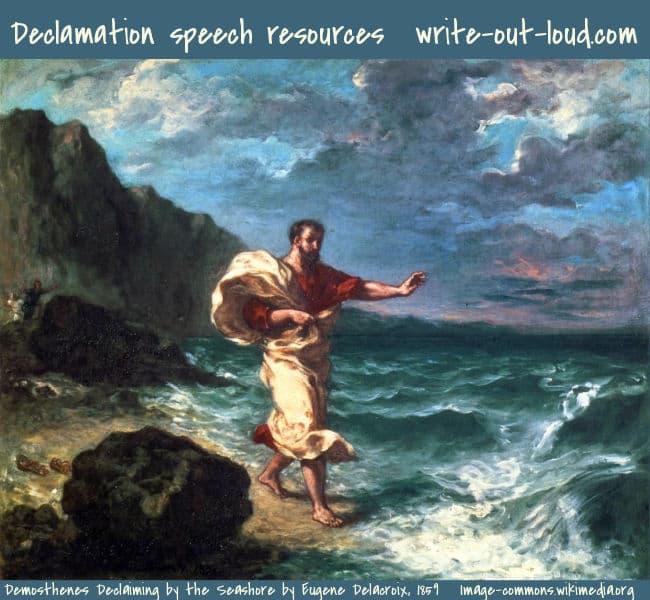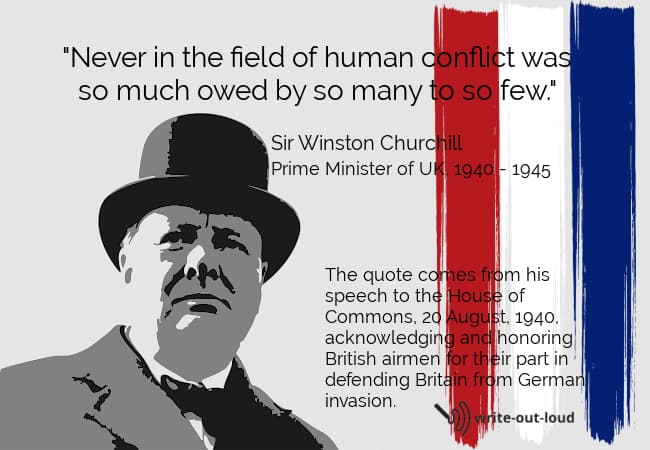
Latest Education and Career News

Declamation Speech Examples for Students and Teachers
Reported by Anshika Saxena
Published on 19 November 2024
A Declamation Speech is one of the trickiest speeches to prepare and deliver. Re-imagining a famous speech from a well-known orator and adding your perspectives to it requires much effort. However, a masterfully delivered Declamation Speech that wins the audience makes all your effort worth it. Through this article, we will discuss the Declamation Speech examples that will help you prepare your speech.
In addition, we will also give you ample insights into preparing an eloquent and well-structured Declamation Speech. So, do check out this article through to the end.

How to Choose a Declamation Speech?
Choosing a Declamation Speech from a renowned orator’s great pieces is no easy task. However, if you keep the following things in mind, you might be able to pick the right Declamation piece to reinterpret in your language.
- Pick a Speech you Personally Resonate With – This is crucial when choosing a Declamation Speech. As you reimagine a great speech from your point of view, it must have a profound impact on you. Otherwise, your attempt to prepare the speech will also come off as half-hearted.
- Pick a Timeless Speech- Your speech topic must be relevant today. If you pick a dated speech, then it might be hard for your audience to connect.
- Pick a Speech with a Strong Theme at its Core- The declamation piece that you choose must be constructed around a strong theme. You must not pick a speech that is just pointless rambling by the orator.
- Pick a Well-Structured Speech- Your speech needs to have a strong opening, an insightful body, and a memorable conclusion. This will make the process of reimagining the speech relatively easier.
- Understand the Significance of the Event- Do not choose a speech that feels out of place in the event. If the speech completely matches the theme of the event, then the audience will connect with it more.
Introduction of a Declamation Speech
The Introduction part of your Declamation Speech can be used to surprise the audience. It is highly likely that the Declamation Piece you are reimagining is known to your audience. Therefore, by not starting the speech in a conventional manner, you can surprise the audience and engross them in the speech.
For this, you can use a few creative elements. This includes a rhetorical question, a baffling statistic, a quote, etc. But keep in mind whatever you include in the speech must fit its context and not appear out of place.
In the introduction, you can also briefly tell the audience why you chose this specific Declamation Piece for your speech.
Declamation Speech Body
A Declamation Speech is given to evoke strong emotions from the audience. However, you cannot have a strong emotional impact on the audience without a suitable build-up. So, you have to infuse the body of your speech with elements of that build-up.
For this build-up, you can use your creativity to the fullest. You can use an anecdote that fits the context of your speech. Moreover, you can use a short and crisp story that ties in with the theme of the speech.
You can also use this part of the speech to give the audience insights into the life of the original orator of the speech. All these things will make the conclusion of your speech more impactful and memorable.
Impactful Conclusion of a Declamation Speech
More often than not, the conclusion of a Declamation Speech is used to persuade the audience to think like the speaker. So, you can also end your speech with a “Call to Action,” asking them to act like the original orator wanted.
Keep in mind you must not just impose your thoughts onto the audience. Feel the emotions of the conclusion yourself and let the audience connect with you. Furthermore, you can end your speech with a takeaway sentence that remains etched in your audience’s brains for a long time.
Things to Keep in Mind While Preparing a Declamation Speech
While preparing your Declamation Speech, you must remember the following things.
- Do not impersonate the original orator of the speech. This way, your speech will come off as disingenuous, and the audience will not be able to connect with it.
- Keep the tone of the speech powerful to have a profound impact on the audience.
- Watch the original speech by the orator multiple times and try to understand their perspective entirely.
- Read your speech aloud and ensure that your pitch is steady.
- Use vocal varieties in your speech and gestures to convey your message to the audience.
- Do not complicate your speech by blending too many ideas.
- Tell the audience about your fondness for the chosen Declamation Speech and its orator to resonate with them emotionally.
- Make sure your speech is brimming with passion and emotion for the entirety of its duration.
Declamation Speech Examples
The following are examples of some of the best Declamation Speech Examples by renowned personalities and takeaway statements from their speeches. You can go through them and accordingly pick a speech to reimagine yourself .

Final Words
We hope our article provided useful insights into Declamation Speech examples, tips, and structure. You can feel free to ask us more of your queries in the comment section below. Also, to keep consuming more useful and worthwhile content like this, stay connected to us through the NVSHQ Homepage .
Anshika Saxena
Leave a Comment Cancel reply
Most recent.

NVSP Voter ID Status 2024: Check Name in NVSP Voter ID List

NCC Certificate Benefits; How to Join NCC?

List of B.Arch Colleges In Kerala NATA Architecture Colleges Fees
List of b.arch colleges in maharashtra nata architecture colleges, list of b.arch colleges in tamil nadu nata architecture colleges seat.

List of Engineering Colleges In Ghaziabad UP Top B.Tech Colleges

Welcome to NVSHQ.ORG. Here you will get all the latest information about the trending things on the internet around India. We focus on how to study tips, Exam guides, education, working techniques, case studies, Exam Answers Keys, Exam Admit card articles.
Dehradun, Uttarakhand
- Games, topic printables & more
- The 4 main speech types
- Example speeches
- Commemorative
- Declamation
- Demonstration
- Informative
- Introduction
- Student Council
- Speech topics
- Poems to read aloud
- How to write a speech
- Using props/visual aids
- Acute anxiety help
- Breathing exercises
- Letting go - free e-course
- Using self-hypnosis
- Delivery overview
- 4 modes of delivery
- How to make cue cards
- How to read a speech
- 9 vocal aspects
- Vocal variety
- Diction/articulation
- Pronunciation
- Speaking rate
- How to use pauses
- Eye contact
- Body language
- Voice image
- Voice health
- Public speaking activities and games
- Blogging Aloud
- About me/contact
Declamation speech resources
How to choose, understand & deliver a declamation speech well.
By: Susan Dugdale
A declamation speech is the term used to describe the re-giving of an important or famous speech.
It could be a political, graduation or commencement speech, a eulogy, a sermon: any type of speech at all as long as it's one that had significant impact on those who heard it.
But what's their purpose? How do you choose a good piece? Where do you look for one? And how do you work with it?
The answers to those questions are here.
What's on this page:
- the purpose of a declamation speech, and its origins
- how to choose a piece - guidelines to follow
- where to look for a piece, links to collections of notable speeches
- how to work with a piece: step by step guidelines covering interpretation, delivery and rehearsal
- links to additional declamation resources
- a definition of declamation as it's used in the phrase 'declamation speech'
The purpose of a declamation speech
The speaker's task is to re-interpret the original, reproducing its power afresh.
Often this exercise will be set as part of studying public speaking skills. The purpose is to have the student directly experience the power of masterfully crafted language. Through their interpretation the techniques and skills of the original orator are learned.
In Toastmasters , the skills learned in giving a declamation speech are covered in the advanced Interpretive Reading manual: project 5 - The Oratorical Speech.
Declamation speech origins
This method of teaching was used in ancient Greece where public speaking was considered a necessary art for anybody embarking on a career in public service.

A declamation was a practice piece set by a teacher for exactly the same reason they are set now: to have a student learn the skills of combining eloquent language with equally eloquent delivery in order to argue or persuade.
The great 4th century Greek orator Demosthenes is said to have honed his craft through studying the speeches of the great orators who preceded him.
Return to Top
Choosing a declamation speech
The speech you choose is critical.
Firstly, you must like it. There's no good to be gained from choosing something because you think it will please or impress your teacher and likewise, judges. You're going to work on this piece to make it your own. Therefore it needs to genuinely reflect you in theme and message.
And secondly it needs a combination of the qualities listed in the following areas:-
- Style of language : Elevated, inspirational, elegant, poetic, masterful - the speech should be an example of 'beautiful' language and construction.
- Structure : Look for unity of purpose. The piece needs to be structurally coherent - have a beginning, development and close. It is not a loose ramble or collection of impressions without form.
- Theme : The message or theme running through it should be worthy of its oratorical treatment, i.e., the style of language specified above. It must be important and applicable beyond the time it was first delivered. For example, Martin Luther King's 'I had a dream' speech has carried its theme down the years without any loss of potency or relevance. (But be warned - choose carefully. A famous speech such as King's 'I had a dream' will have been heard and heard again. You need something of similar impact but with considerably less profile.)
- Impact : The speech must have reached and grabbed the hearts and minds of its listeners. It will have persuasively challenged and changed the way people thought and acted, uniting and inspiring them toward a common goal or course of action.
If you're choosing for a competition before you make your choice be sure to review the guidelines and do take note of the allocated time. Be prepared to cut your selection to fit.
Search for a declamation piece
Looking for just the right extract takes time. The links below are a good starting point.
Other avenues worth exploring are archives of previous declamation competition winners, asking for help from your teachers, or librarians, experimenting with search words: eulogies, motivational or persuasive speeches, civil rights speeches ...
Keep going until you find something you know you'll feel wholehearted about.
Famous speeches from African Americans
- African American History: Major Speeches
- Say It Plain - American Radio Works -A century of great African American speeches
- Notable Speeches and Letters by African Americans from Benjamin Banneker to Barack Obama
Famous American speeches
- American Rhetoric - a 5000+ database of speeches, including the top 100 speeches
Famous speeches - world wide
- A cross-cultural collection of famous speeches, both historical and contemporary
Famous speeches by women

- 25 Powerful Commencement Speeches by Famous Women
- History’s Most Powerful Speeches Given By Women

Listen and watch: famous speeches
- Learn Out Loud - podcasts of 10 famous speeches
- 25 of the most shared TED talks of all time
Understanding your declamation piece

- Make getting to know your piece your top priority If you learn or memorize the text of the speech without understanding it your delivery will become an ultimate blah-blah-blah talking head presentation.
Find out about the original context of the speech
What was the occasion the speech was written for? What period of time was it? What was happening in society generally?
Who was the audience? Why had they come along to hear the speaker? What did they need or expect from the speech?
Find out about the person who originally gave the speech
Who was he or, she? What passions drove them? Did they write the speech themselves? What did they want from the speech? (Was there a specific purpose or goal?)
What delivery characteristics did they use? Any particular habits?
What does this speech mean to you?
Can you put what is being said into your own words? The more you dig into the meaning of the piece, emotionally and intellectually, the more able you'll be to convey it convincingly.
Print the speech in a clear font and double spaced
You will use the gaps to write yourself notes and mark it up for delivery. For example, putting in the pauses, or breath points, the places to soften your voice, increase the volume or, for movement.
Make several copies. You are going to need them. ☺
Listen to the original speaker
If you can, listen to original speech while reading your copy. Note how the speaker is using their voice. What qualities are you hearing? Do they change for different portions of the speech? Why? Can you hear a beat or rhythm? What effect does that have?
Listen until you can clearly identify changes in tone, pitch, and pace, and know why it's being done.
The goal of delivering a declamation speech well

The goal is not to impersonate, or mimic, the original speech maker.
For example, if you are working with one of Winston Churchill's war time speeches* you don't have to 'become ' him, in the same way an actor would if he was playing him in a play or a film
However you do have to find and sincerely draw out the qualities of the speech making it memorable. That, is your goal.
*To see the full text of the speech the quote is drawn from, and much, much more about Winston Churchill, visit: The Few, 1940 .
Rehearsing your speech
Along with choosing an appropriate piece, and understanding it, thorough and regular practice is what will distinguish what you do from everyone else.
If you're serious about performing well, check these links.

Begin with these full guidelines on how to rehearse . You'll find an easily followed step by step process, with detours into other areas should you need them:
- vocal variety to bring color and interest into your voice
- help to use pause and pace effectively, as well as,
- diction exercises to clear up any sloppy pronunciation issues
Extra Resources
Declamation Competitions This is a Wikipedia page with ongoing links to the National Catholic Forensic League and the Theodore Gibson Oratorical Project . And here's a link to a set of excellent resources from forensicscommunity.com . There is a wealth of information here: guides, a forum and links to videos. It's a must-look site if you're serious about performing to the best of your ability.
Declamation definition
The action or art of declaiming; the repeating or uttering of a speech, etc. with studied intonation and gesture.
- A public speech or address of rhetorical character; a set speech in rhetorical elocution.
- Declaiming or speaking in an impassioned oratorical manner; fervid denunciation with appeals to the audience.
- A speech of a rhetorical kind expressing strong feeling and addressed to the passions of the hearers; a declamatory speech, a harangue.
- Renunciation, repudiation, disclaimer.
For more see the multiple definitions gathered together on one page by thefreedictionary.com/declamation
- Return to top of declamation speech
speaking out loud
Subscribe for FREE weekly alerts about what's new For more see speaking out loud

Top 10 popular pages
- Welcome speech
- Demonstration speech topics
- Impromptu speech topic cards
- Thank you quotes
- Impromptu public speaking topics
- Farewell speeches
- Phrases for welcome speeches
- Student council speeches
- Free sample eulogies
From fear to fun in 28 ways
A complete one stop resource to scuttle fear in the best of all possible ways - with laughter.

Useful pages
- Search this site
- About me & Contact
- Free e-course
- Privacy policy
©Copyright 2006-24 www.write-out-loud.com
Designed and built by Clickstream Designs
Discover, Learn, Contribute, Connect
How to Say a Declamation Speech: Tips, Examples, and Regional Variations
Welcome to our comprehensive guide on how to deliver a powerful declamation speech! Whether you are preparing for a competition, a school assignment, or simply want to improve your public speaking skills, we’ve got you covered. In this guide, we will explore both the formal and informal ways of delivering a declamation speech, focusing primarily on universal tips and examples. So, let’s dive in and discover how you can captivate your audience through the art of declamation!
Table of Contents
1. Understanding Declamation Speech
Before we delve into the techniques of delivery, it’s important to understand the essence of a declamation speech. A declamation speech is a passionate rendering of a famous or significant piece of literature, art, or oratory. It involves embodying the emotions, intentions, and dramatic elements of the original work, and effectively conveying them to your audience.
2. Formal Ways of Delivering a Declamation Speech
When it comes to formal declamation speeches, here are some crucial tips to elevate your performance:
A. Maintain Proper Posture:
Stand upright, with your shoulders relaxed, and keep your head high. This conveys confidence and establishes a commanding presence on stage.
B. Project Your Voice:
Speak clearly and audibly, ensuring your voice reaches every corner of the room. Articulate your words precisely, emphasizing important phrases to evoke the desired impact.
C. Utilize Facial Expressions:
Your face is a powerful tool to convey emotions. Use appropriate facial expressions to amplify the sentiment of your speech, be it anger, sadness, or joy.
D. Master Body Language:
Your gestures should complement your spoken words. Use your hands purposefully, and employ controlled movements or deliberate stillness to enhance the drama and meaning of your message.
3. Informal Ways of Delivering a Declamation Speech
Informal declamation speeches, which are often used in casual settings or as part of creative expression, provide more flexibility and room for personal interpretation. Here are some tips for an engaging informal delivery:
A. Connect with Your Audience:
Engagement is key in informal declamation speeches. Establish a conversational tone, maintain eye contact, and try to build a connection with your audience to make your performance more relatable and impactful.
B. Emphasize Your Personality:
Showcase your own style and personality while delivering the speech. Add small anecdotes or personal insights that align with the original work to create a unique performance that reflects who you are.
C. Use Appropriate Language:
While informality allows more freedom in language, ensure that it is still appropriate for the audience and context. Tailor your delivery to match the expectations and sensibilities of your listeners.
D. Incorporate Humor or Wit:
If the original piece allows, consider injecting humor or wit into your performance. Well-placed comedic elements can engage the audience and add depth to your delivery.
4. Regional Variations
Although declamation speeches are not typically associated with specific regional variations, it’s worth exploring cultural nuances if you are delivering a speech in a particular locale. Localizing your delivery can help you connect more deeply with your audience and showcase your understanding of their customs and traditions.
A. Pronunciation:
If delivering a declamation speech in a specific region, familiarize yourself with any unique pronunciations prevalent in that area. Accurate pronunciation will demonstrate your attention to detail and respect for the local audience.
B. Gesture Interpretation:
Body language and gestures can vary across cultures. If you are presenting in a region with distinct cultural norms, be mindful of any gestures that may be offensive or misunderstood, and adjust your performance accordingly.
5. Examples of Declamation Speeches
To further illustrate the art of declamation, here are a few examples of renowned speeches that you can study and use as inspiration:
- “I Have a Dream” by Martin Luther King Jr.
- “The Gettysburg Address” by Abraham Lincoln
- “The Ballot or The Bullet” by Malcolm X
- “Inaugural Address” by John F. Kennedy
“We hold these truths to be self-evident: that all men are created equal.”
These examples cover a range of emotions, historical contexts, and delivery styles, enabling you to understand the diverse possibilities of declamation speeches.
A declamation speech is a powerful tool to express the emotions and messages embedded in significant literary works. By mastering the art of declamation, both formally and informally, you can captivate your audience and leave a lasting impression. Remember to embrace the specific techniques discussed, adapt them to your style, and always maintain a warm and engaging tone. So, go forth, practice diligently, and let your declamation speech take center stage!
Related Guides:
- How to Say a Birthday Speech: Tips, Examples, and Regional Variations
- How to Say a Debate Speech: Tips, Examples, and Regional Variations
- How to Deliver a Speech in School: Tips, Examples, and Regional Variations
- How to Say a Speech in School: Tips, Examples, and Variations
- How to Say Introduction in Speech: Tips, Examples, and Variations
- Tips for Delivering a Successful Speech
- How to Say a Good Speech: Formal and Informal Ways, Tips, and Examples
- Tips and Examples for Delivering Your Speech
About The Author
